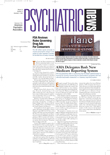Depressed adolescent outpatients receiving psychotherapy but not medication displayed rates of emergent suicidality comparable to those reported in antidepressant trials, according to a new study.
Self-reported ideation at intake was the best predictor of eventual suicidality in that group, wrote Jeffrey Bridge, Ph.D., and four colleagues at the Western Psychiatric Institute and Clinic of the University of Pittsburgh Medical Center, in the November American Journal of Psychiatry. Self-report is often more accurate than interviews about sensitive topics like suicidal thoughts, sexual behavior, and substance use, they concluded. The study was funded by the National Institute of Mental Health (NIMH).
“Suicidality is fairly common among depressed kids, even when they are getting psychotherapy without SSRIs,” said study coauthor David Brent, M.D., in an interview. “Many kids deny suicidality on interview but admit to it on self-report.”
The researchers defined suicidality as a rating of at least 4 on the K-SADS suicide ideation item—suicidal ideation with a plan or an actual suicide attempt.
The emergence of suicidality probably could not be attributed to treatment, but rather to the “specific and systematic assessment” of self-reported suicidality, according to Bridge and his colleagues. Usually clinical trials rely on participants or investigators to report adverse events after they occur.
“These findings raise methodological issues for the design and interpretation of psychotherapy and pharmacotherapy treatment trials of depression in young patients,” wrote the researchers.
Self-report is a reasonable source for information, but must be balanced by the knowledge that adolescents are notoriously volatile regarding suicidality, said Howard Sudak, M.D., a clinical professor of psychiatry at the University of Pennsylvania.
“We think of suicide as falling along a continuum from ideation, to planning, to attempt and completion,” said Sudak in an interview.“ The hardest to evaluate is ideation, but 60 percent of high school students have had ideation at some point.”
Bridge and colleagues recruited 107 subjects aged 13 to 18 who were diagnosed with major depressive disorder and scored 13 or higher on the Beck Depression Inventory. Patients were randomized to cognitive-behavioral therapy, systemic behavioral therapy, or nondirective supportive therapy. Treatment assignment, age, sex, race, and socioeconomic status had no effect on outcomes. The only significant predictor of emergent suicidality was a higher score on Beck Depression Inventory item 9. Of the 107 patients, 88 denied current suicidality the week before evaluation, and 11 of that group developed suicidality during treatment. One attempted suicide.
Self-reported suicidality in the week before intake was a better predictor than information gained in the intake interview, treatment assignment, cognitive distortion, or depression severity, wrote the researchers.“ Self-report may be a necessary component to the assessment of adolescent suicidal risk.”
Future clinical trials of therapies for depression in adolescents should evaluate self-reported suicidality at intake and consider balancing treatment arms on that basis, they concluded.
Brent's study represents a useful starting point, said Sudak, but he would like to see larger, more definitive studies with matched controls in and out of therapy.
“I'd like to know what the base rate is in an untreated population and compare it to patients in therapy or on drugs,” he said, especially in light of the U.S. Food and Drug Administration's black-box warning about suicidality among antidepressant users.
“The studies that produced the black-box warnings had nothing to do with deaths by suicide, just ideation and attempt,” said Sudak, who favors using SSRIs and SSNIs in appropriate candidates for treatment.“ I'm happy to see another study that seems to indicate that we are overreacting. I think more harm is done by discouraging practitioners from using these drugs when they should use them than would be engendered by using them.”
“We are going to look at this type of analysis in a multisite study, called TORDIA (Treatment of Resistant Depression in Adolescents) funded by NIMH, which will be completed in about one year,” he said. “One exciting thing about that study is that we will have drug and metabolite concentrations on almost all the subjects.”
Am J Psychiatry 2005 162 2173
